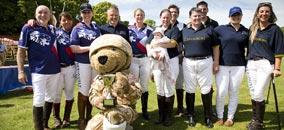
4 minute read
Equestrian
Equestrian Polo: Sport of kings set for comeback
By Jade Leahy
The exact origin of polo – ‘the sport of kings’ is unknown, but it is likely to have been first played by the nomadic warriors in the middle east 2,000 years ago. Its name is derived from the Balti word ‘pulu’ meaning ball and can even be played on elephants. It was brought to us by the Army. The sport of kings is played right-handed, the stick is held in the right hand whilst the pony steered with the left hand. Tedworth Park offers all levels of polo up to 8 goal but is also known for offering beginners the chance to experience the game. Each low goal game consists of 4 chukkas of 7.5 minutes each and is played 4 aside, the polo pony plays a maximum of 2 nonconsecutive chukkas in any game. A polo pony is around 15 hands and many are thoroughbred, although a lot have been sourced from south America. Tedworth Park in Wiltshire is a local home to Polo. The county is also the home of local armed forces and Tedworth House, which is run by Help for Heroes and supports injured service personnel. Tedworth Equestrian Charity took over Tedworth park in 2018. It’s is a low goal polo club with the largest low goal polo membership in the country, with a mix of approximately 60% military members and 40% civilian members. Manager Jess has a 1 goal mixed and 5-goal ladies handicap and has been the polo manager since 2010. She grew up around horses and played polo at Millfield She’s a fantastic level 3 coach and HPA accredited assessor. Covid permitting, the club’s biggest fixture of the year, the Rundle cup match (army verses navy) takes place on 10th July and Help for Heroes day is 5th of June. The Help for Heroes day has been one of the club’s most important fixtures for the last seven years because it showcases the growing sport of para polo. The para team manage a variety conditions, ranging from PTSD to spinal injury and limb loss. The day includes the renowned Navy verses RAF and Army verses women in polo matches. Women in Polo is aimed at promoting ladies’ polo, particularly at amateur level. Ladies currently reign unbeaten. If you can canter competently, you too could try your hand at a chukka but the club can also offer taster sessions for even the most inexperienced of riders. Individual lesson: £95 per hour Group tasters for 4 people from £85 each per hour and threeday intensive courses for £650 Jess Andrews 07740 723353 tedworthparkpolo.com
EQUINE CLASSIFIEDS
ORGANIC SMALL HAY BALES, 2020, £4 per bale, contact: goldhill organicfarm@gmail.com - call 01258 861916
PADDOCKS For all your Paddock & Field maintenance, call Mark 01747 821271 or 07810 540725
HORSE PADDOCK SERVICES Chain harrowing, rolling, aerating, over seeding, spraying & topping with ATV Call Nick 07495 090101
Bedrap, Bedmax, white shavings, wood pellets, chopped wheat, hay and straw. Ring Val 07889 064294
SMALL WHEAT STRAW and some small and big hay bales for sale 01258 880558
Spare a thought for riding schools struggling in lockdown
By Charlotte Williams
After reading about the struggles of the nation’s riding schools in a well-known equine magazine, I thought I would call Alison of Pevlings Riding School in the aptly named Horsington, who I last spoke to in November. Alison told me that although the first lockdown had been tough, the better weather had made life more bearable. This time around things at the riding school are even tougher. Income has dropped and the riding school is operating with a handful of staff to care for the horses, who still need bedding, food, hay and sundries. But fortunately, Alison told me about the kindness of many. Alison’s horse feed is supplied by a company called Dengie, who have very generously donated bags of feed for the horses of which Alison said was an extremely kind and welcome gesture. Any extra help, no matter how small, is very much appreciated at the moment, especially as costs always escalate at this time of year, with large amounts of hay, feed and bedding required, not to mention the ongoing cost of shoeing, worming and veterinary care. And the weather has been grim. Anyone who works outdoors knows that this time of year is particularly hard, you are either frozen solid or soaked to the skin. It is hard for the horses too. As there are no lessons, many of Alison’s horses are lacking their regular amount of work, which in the drier summer months is not such a problem, but with all the rain the fields are at saturation point, and many horses are unable to be turned out, which has become a real problem. The fields in February are often more mud than grass, which, as any horse owner will know, can lead to the dreaded mud fever. This is a horrible, painful condition for the horse, which is very hard to prevent and equally hard to treat. Pevlings Riding School like so many others, have been affected for nearly a year now and with their continuing loss of income they are almost reaching crisis point. I am very aware that without people’s generosity many of these establishments may not survive, which would be a great shame for so many horse lovers. But in brighter news, Boris has just announced the reopening of outdoor sports facilities from March 29, which will come as a huge relief not only to Pevlings but for so many other riding schools. Let all horse lovers support our local equestrian facilities!









